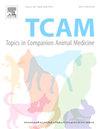Prevalence and molecular characterization of Trypanosoma evansi infections in dogs using RoTat 1.2 VSG gene from Punjab state, India
IF 1.3
3区 农林科学
Q2 VETERINARY SCIENCES
引用次数: 0
Abstract
The present study aims at development, standardization and application of Rode Trypanozoon antigenic type 1.2 variant surface glycoprotein (RoTat 1.2 VSG) gene based-PCR assay for the detection of Trypanosoma evansi in dogs of Punjab state, India. The prevalence rate was evaluated by screening 482 canine blood samples collected from various districts by microscopy and the standardized PCR assay. The T. evansi prevalence was estimated as 0.21 % (1/482) and 1.45 % (7/482) with microscopy and PCR assay, respectively. The comparative analysis of diagnostic sensitivity and specificity of PCR assay with microscopy revealed ″fair″ agreement by kappa value statistics between the two tests with a statistically significant (p<0.05) variation. Assessment of risk factors (age, breed, location, season and sex) associated with T. evansi infection, recorded a significant (p<0.05) correlation with age of host. The cladistics genetic diversity analysis of generated sequence data of RoTat 1.2 VSG gene exhibited 99.9-100.0 % homology among various T. evansi isolates of dogs. In the present study 03 sequences of RoTat 1.2 VSG gene from Punjab isolates were generated and used for the haplotype network analysis along with 16 T. evansi GenBank archived sequences. The sequences from India corresponding to different hosts revealed 09 haplotypes.
利用印度旁遮普邦RoTat 1.2 VSG基因对犬伊文氏锥虫感染的流行和分子特征进行分析
本研究旨在建立、标准化和应用印度旁遮普邦犬犬伊文氏锥虫抗原1.2型变异表面糖蛋白(RoTat 1.2 VSG)基因pcr检测方法。采用镜检法和标准化PCR法对各地区采集的482份犬血样进行筛选,评估其患病率。镜检和PCR检测结果显示,伊文氏弓形虫患病率分别为0.21%(1/482)和1.45%(7/482)。显微镜下PCR检测诊断敏感性和特异性的比较分析显示,两种检测kappa值统计结果吻合″公平″,差异有统计学意义(p<0.05)。与伊瓦西绦虫感染相关的危险因素(年龄、品种、地点、季节和性别)评估显示,与宿主年龄有显著(p < 0.05)的相关性。对生成的RoTat 1.2 VSG基因序列数据进行了分支学遗传多样性分析,结果显示犬伊瓦西弓形虫各分离株的同源性为99.9 ~ 100.0%。本研究从旁遮普分离株中提取了03个RoTat 1.2 VSG基因序列,并与T. evansi GenBank存档的16个序列进行了单倍型网络分析。来自印度的不同寄主对应的序列显示出09个单倍型。
本文章由计算机程序翻译,如有差异,请以英文原文为准。
求助全文
约1分钟内获得全文
求助全文
来源期刊

Topics in companion animal medicine
农林科学-兽医学
CiteScore
2.30
自引率
0.00%
发文量
60
审稿时长
88 days
期刊介绍:
Published quarterly, Topics in Companion Animal Medicine is a peer-reviewed veterinary scientific journal dedicated to providing practitioners with the most recent advances in companion animal medicine. The journal publishes high quality original clinical research focusing on important topics in companion animal medicine.
 求助内容:
求助内容: 应助结果提醒方式:
应助结果提醒方式:


